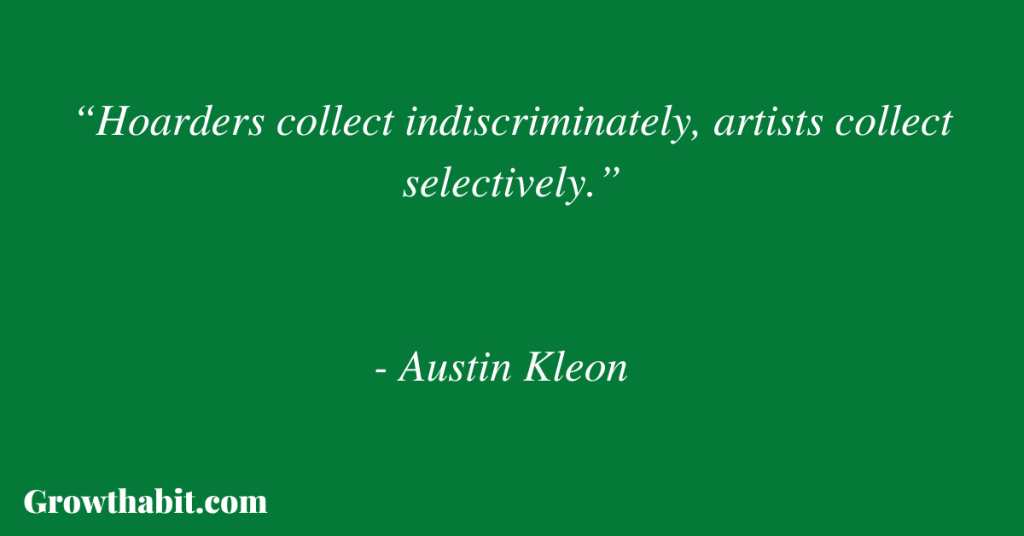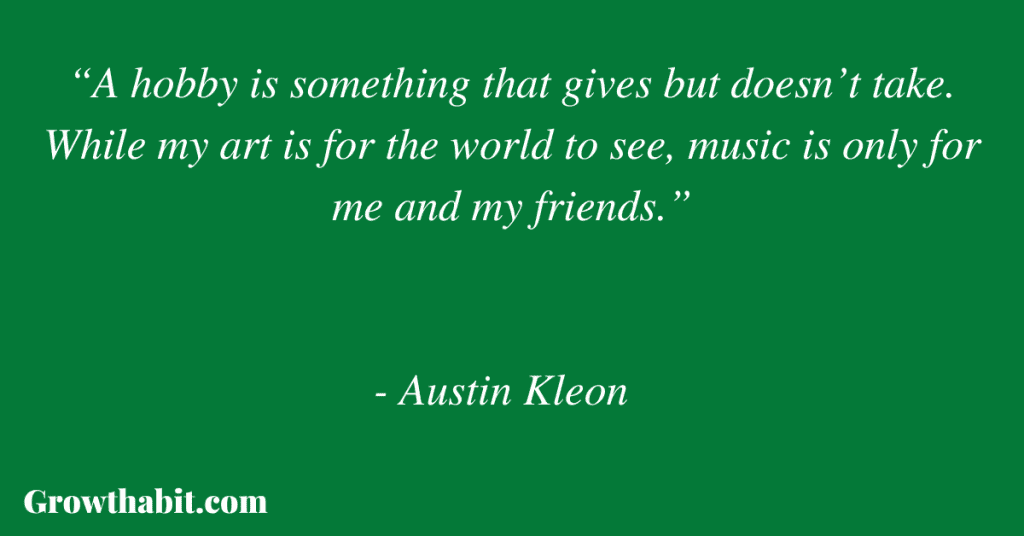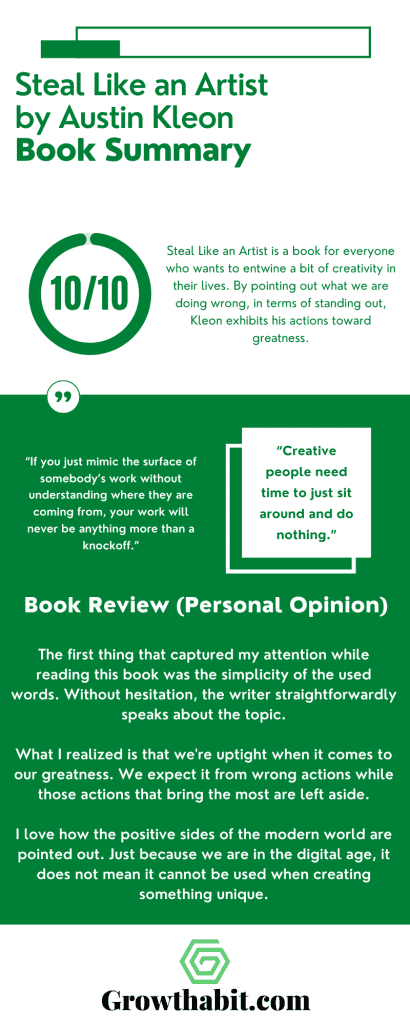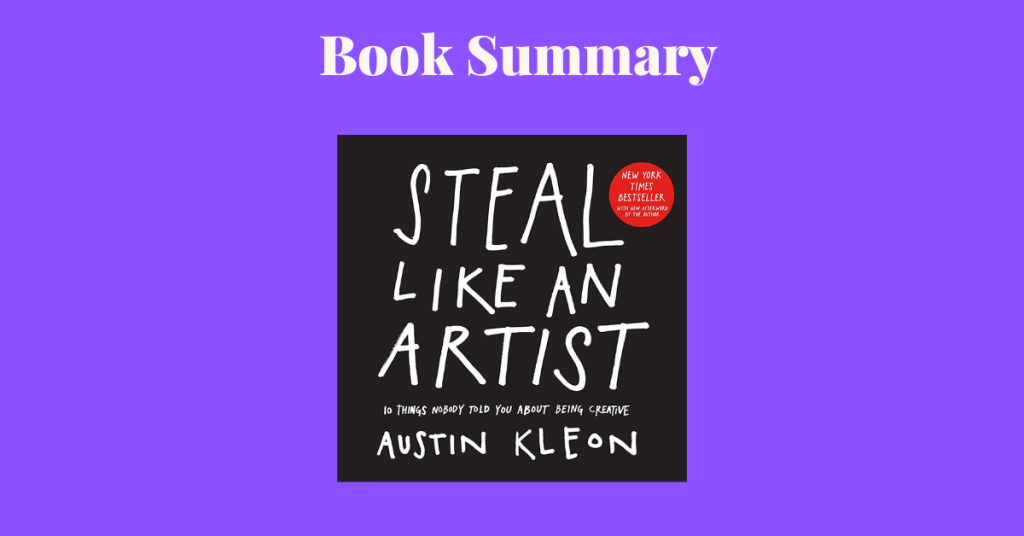Steal Like an Artist is a book for everyone who wants to entwine a bit of creativity in their lives. By pointing out what we are doing wrong, in terms of standing out, Kleon exhibits his actions toward greatness.
Book Title: Steal Like an Artist, 10 Things Nobody Told You About Being Creative
Author: Austin Kleon
Date of Reading: May 2023
Rating: 10/10
What Is Being Said In Detail
Sometimes we wander around trying to force creativity, whereas this book shows the simplicity of the process.
It goes through basic everyday actions which bring the most out of us, like using our body instead of just our mind, having multiple things going on, following our process with calendars and notes, and even being bored and doing nothing.
The writer drops the cruel truth on us: there is no originality. We are all a mixture of something that already exists.
CHAPTER ONE – Steal Like an Artist.
The chapter tells us how artists look at the world and reveals the secret of originality. The writer entwines genetics as an example of how original we are. It concludes with very simple logic: you are good as the stuff you surround yourself with. No matter if we are in school or not, we have to wonder about the world constantly and observe.
CHAPTER TWO – Don’t Wait Until You Know Who You Are to Get Started.
Chapter 2 pushes us not to wait for things to happen but rather to do stuff without waiting. To succeed, we have to pretend we are something we are not until we become what we are pretending to be. With quotes from many famous artists, the book tells us it’s okay to copy multiple people since it’s a way to find ourselves. It shows us what good theft is.
CHAPTER THREE – Write the Book You Want to Read.
Chapter 3 motivates us not to step back in our creativity. We should rather follow our feelings and do what we would like to see done.
CHAPTER FOUR – Use Your Hands.
This chapter is oriented on the importance of old-school work. In the digital age, people lose the sense of actual creation of ideas and therefore, the writer puts out there what we can do and how to mix analog with digital.
CHAPTER FIVE – Side Projects and Hobbies Are Important.
How important things we do while procrastinating are given in Chapter 5. We learn that doing nothing is a way to get inspired. Another piece of this lesson is the beauty of having diverse interests and hobbies and how they can complete each other.
CHAPTER SIX – The Secret: Do Good Work and Share It with People.
Chapter 6 reveals another secret, the secret of getting known. A very simple formula is given. When they say sharing is caring, it is true. Throughout the examples, you can see how beneficial sharing your secrets is for the listener and also for you.
CHAPTER SEVEN – Geography Is No Longer Our Master.
Chapter 7 reminds us that we are never limited. If we feel stuck, we can create our own little world and draw energy from it. How you can do it you hear from the writer’s own experience. It also explains how big of an impact a change makes when it comes to our creativity.
CHAPTER EIGHT – Be Nice. (The World Is a Small Town.)
Throughout Chapter 8, we talk about kindness and positive energy towards people but also how anger can be beneficial for our drive to work harder and make something. The trick to boost your energy while you are having one of those days when you wish to quit is mentioned at the end of the chapter.
CHAPTER NINE – Be Boring. (It’s the Only Way to Get Work Done.)
Chapter 9 is about us and our well-being throughout the creative processes. At the end of the day, we don’t want to burn out or barely survive in this world. The key is to find balance, and the writer shows us how to do it, like having a logbook. He even shows us a few pages from his own.
CHAPTER TEN – Creativity Is Subtraction.
The last chapter completes the story with the conclusion that having endless options kills creativity. Since the book gives many ideas, the writer was kind enough to guide us at the end of the chapter on what to do next or where to begin.
Most Important Keywords, Sentences, Quotes
CHAPTER ONE – Steal Like an Artist.
„Everything is up for grabs. If you don’t find something worth stealing today, you might find it worth stealing tomorrow or a month or a year from now.”

“The writer Jonathan Lethem has said that when people call something “original,” nine out of ten times they just don’t know the references or the original sources involved.”
“As the French writer André Gide put it, “Everything that needs to be said has already been said. But, since no one was listening, everything must be said again.”
“You are, in fact, a mashup of what you choose to let into your life.”
“Hoarders collect indiscriminately, artists collect selectively.”
“There’s an economic theory out there that if you take the incomes of your five closest friends and average them, the resulting number will be pretty close to your own income.”
“The great thing about dead or remote masters is that they can’t refuse you as an apprentice. You can learn whatever you want from them. They left their lesson plans in their work”
“It’s not the book you start with, it’s the book that book leads you to.”
CHAPTER TWO – Don’t Wait Until You Know Who You Are to Get Started.
„[…]you have to dress for the job you want, not the job you have, and you have to start doing the work you want to be doing.”
„The writer Wilson Mizner said if you copy from one author, it’s plagiarism, but if you copy from many, it’s research. ”
“If you just mimic the surface of somebody’s work without understanding where they are coming from, your work will never be anything more than a knockoff.”
“Imitation is about copying. Emulation is when imitation goes one step further, breaking through into your own thing.”
“A wonderful flaw about human beings is that we’re incapable of making perfect copies. Our failure to copy our heroes is where we discover where our own thing lives.”
“In the end, merely imitating your heroes is not flattering them. Transforming their work into something of your own is how you flatter them. Adding something to the world that only you can add.”
CHAPTER THREE – Write the Book You Want to Read.
„The best advice is not to write what you know, it’s to write what you like. Write the kind of story you like best—write the story you want to read.”
“Draw the art you want to see, start the business you want to run, play the music you want to hear, write the books you want to read, build the products you want to use—do the work you want to see done.”
CHAPTER FOUR – Use Your Hands.
“While I love my computer, I think computers have robbed us of the feeling that we’re actually making things.”
“We need to move, to feel like we’re making something with our bodies, not just our heads.”
“You need to find a way to bring your body into your work. Our nerves aren’t a one-way street—our bodies can tell our brains as much as our brains tell our bodies.”
“The computer brings out the uptight perfectionist in us—we start editing ideas before we have them.”
CHAPTER FIVE – Side Projects and Hobbies Are Important.
„It’s the side projects that really take off. By side projects I mean the stuff that you thought was just messing around.”
„Creative people need time to just sit around and do nothing“

„A hobby is something that gives but doesn’t take. While my art is for the world to see, music is only for me and my friends.”
CHAPTER SIX – The Secret: Do Good Work and Share It with People.
„This is actually a good thing, because you want attention only after you’re doing really good work.”
“You should wonder at the things nobody else is wondering about. If everybody’s wondering about apples, go wonder about oranges.”
“You don’t put yourself online only because you have something to say—you can put yourself online to find something to say.”
“If you’re worried about giving your secrets away, you can share your dots without connecting them.”
CHAPTER SEVEN – Geography Is No Longer Our Master.
„You don’t have to live anywhere other than the place you are to start connecting with the world you want to be in.”
“Your brain gets too comfortable in your everyday surroundings. You need to make it uncomfortable”
“Travel makes the world look new, and when the world looks new, our brains work harder.”
“Personally, I think bad weather leads to better art. You don’t want to go outside, so you stay inside and work.”
“The good news is that nowadays, a lot of your peers are right where you left them—on the Internet.”
CHAPTER EIGHT – Be Nice. (The World Is a Small Town.)
„If you ever find that you’re the most talented person in the room, you need to find another room.”
“So go on, get angry. But keep your mouth shut and go do your work.”
“The important thing is that you show your appreciation without expecting anything in return, and that you get new work out of the appreciation.”
“Once you put your work into the world, you have no control over the way people will react to it.”
CHAPTER NINE – Be Boring. (It’s the Only Way to Get Work Done.)
„That whole romantic image of the creative genius doing drugs and running around and sleeping with everyone is played out. It’s for the superhuman and the people who want to die young. The thing is: It takes a lot of energy to be creative. You don’t have that energy if you waste it on other stuff.”
“The art of holding on to money is all about saying no to consumer culture”
“Writing a page each day doesn’t seem like much, but do it for 365 days and you have enough to fill a novel. One successful client pitch is a small victory, but a few dozen of them can get you a promotion.”
“In the old days, a logbook was a place for sailors to keep track of how far they’d traveled, and that’s exactly what you’re doing—keeping track of how far your ship has sailed.”
“Relationships are hard enough, but it takes a real champion of a person to be married to someone who’s obsessed with a creative pursuit.”
CHAPTER TEN – Creativity Is Subtraction.
„Nothing is more paralyzing than the idea of limitless possibilities. The idea that you can do anything is absolutely terrifying.”
„It seems contradictory, but when it comes to creative work, limitations mean freedom.”

“It’s often what an artist chooses to leave out that makes the art interesting. What isn’t shown versus what is. It’s the same for people: What makes us interesting isn’t just what we’ve experienced, but also what we haven’t experienced.”
Book Review (Personal Opinion):
The first thing that captured my attention while reading this book was the simplicity of the used words. Without hesitation, the writer straightforwardly speaks about the topic.
What I realized is that we’re uptight when it comes to our greatness. We expect it from wrong actions while those actions that bring the most are left aside.
I love how the positive sides of the modern world are pointed out. Just because we are in the digital age, it does not mean it cannot be used when creating something unique.
Rating: 10/10
This Book Is For:
- Artists
- Designers
- Writers
If You Want To Learn More
Check out Austin Kleon’s TEDx talk on this topic:
Steal Like An Artist: Austin Kleon at TEDxKC
How I’ve Implemented The Ideas From The Book
As someone who does not have a strong artsy side, I have enjoyed reading this book.
It certainly gave me ideas on how to become more creative but also productive. Even though I am a freestyle person, without having calendars around me, the content inspired me to become more organized.
Another idea I am going to implement is having a logbook. Summing up my life on a piece of paper every day feels like excitement to have in the far future when I take a look at it.
Lastly, observing more and letting loose is a lesson to receive from the book.
One Small Actionable Step You Can Do
The book gives very concrete steps towards progress and it’s mostly on the individual level.
If you wonder which part of the book is the biggest eye opener, pay attention to Chapter 4. Modern world requires a lot of thinking and work of mind, whereas the physical aspect has been put aside. Classic is always in style. There are many situations in our lives that make us go to our roots, the old-school ways.
As citizens of this century, we indeed have endless possibilities, and it has never been harder to choose a path and to follow it. Therefore, Chapter 10 is useful for building the discipline of choice.

